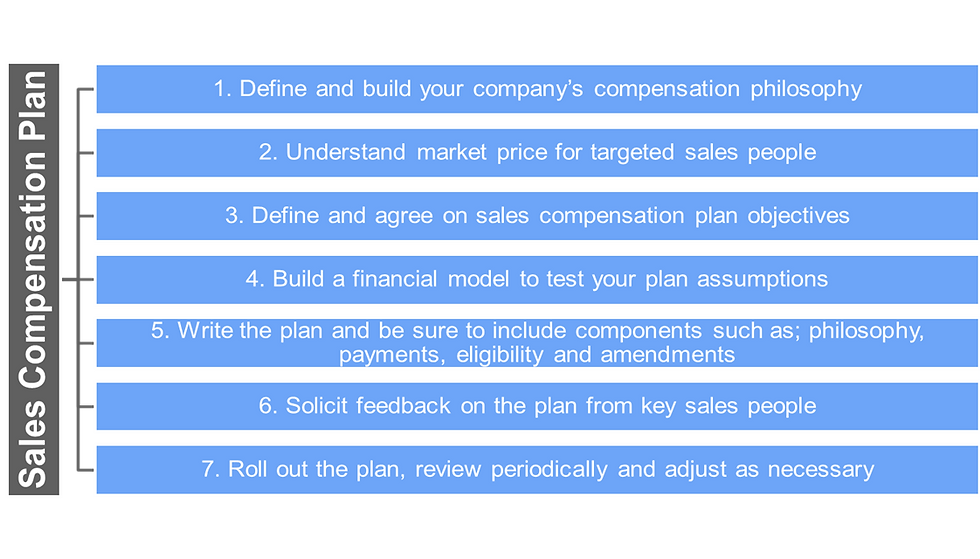Why your sales compensation plan isn't working.
- Neal Benedict
- Jun 22, 2023
- 3 min read
Updated: Jun 29, 2023

Any behavioral economist will tell you that incentives work. While it is true that not everyone is motivated by the same incentives (like money) it is also true that sales people are and should be highly motivated by what shows up in their paycheck each month. A sales person who isn’t clearly motivated to earn the highest return for her efforts will not likely be motivated to achieve the highest returns for your company. Regardless of what many will tell you, it isn’t a moral to seek and expect a high return for personal efforts and for a sales person this return is often more 0s at the end of the number on their commission check.
However, a sales compensation plan should do much more than allow sales people to be paid fairly for their efforts. It must first and foremost align with company goals and objectives. It needs to reflect how the company plans to grow by identifying, qualifying, closing and maintaining the right customers. Many sales plans that I see are actually incentivizing sales teams to achieve goals that are in direct opposition to the company strategy. You should be able to look at a sales compensation plan and understand the company goals and strategy. If not you have done something wrong.
Ask yourself the following questions when starting down the road of building a sales compensation plan.

Developing a sales compensation plan is part science and part art. As a company you want to ensure that it is a valuable tool and that it continues to deliver against its intended goals of encouraging a highly motivated team to achieve exceptional sales performance. Most plans have a tendency to either over or under reward sales performance. Neither of which is advantageous or sustainable for your business. There is a fair amount of upfront work to understand the cost of compensating your sales force. Financial modeling of your plan is critical. In addition to the financial incentives of a sales compensation plan I have witnessed some very creative non-cash ways to motivate the sales team. I wouldn’t rely on these to any great extent, but a creative plan can include non-cash based compensation.
There are many types and variations of sales plans. This list isn't exhaustive, but here are some of the most common.
Salary only
These are no-risk compensation plans sometimes reward sales people through larger and more frequent salary increases
Commission only
These are 100% at risk plans and only pay out on sales generated
Hybrid plans
These plans will combine some level of at risk and fixed compensation they include;
A salary plus a bonus
Commission plus a bonus
Salary plus commission
Guaranteed commission
Draw plans
I tend not shy away from one type of sales compensation plan being better than another in every situation. I believe that you should let your compensation philosophy be the cornerstone of your plan and build from there. Let me outline the basic steps to building your sales compensation plan.

Other considerations or details you should keep in mind while building your sales compensation plan (and fundamentally should have answers for) and prior to rolling out the plan.
- Have a defined territory/market for each sales person
- Understand the revenues and profits historically generated in that territory/market
- Ensure that territories/markets are logical and are as fair and equitable as possible
Building a sales compensation plan is a bit like building a house. There are some common things that all houses need, but much is left to the discretion of the builder. The builder understands the terrain, the climate, the market conditions and the buyers. The builder of the sales compensation plan should be no less informed about her territories, market, competitors and sales people.
Understanding these variables will help you to build a suitable plan.
Building a successful sales compensation plan is challenging, but with the right approach and process you can build a plan that is fair to the company and to the sales team while driving the most revenue possible for your company. Simply do the following and you will be surprised at how successful you will be.
Be realistic and keep an open mind
Drive the plan by business logic – keep emotions out of the decision making process
Sales people are motivated by money, but not exclusively so
A happy sales team is an efficient and productive sales team
Both turnover and recruiting will be impacted by your sales compensation plan
.png)
Comentários